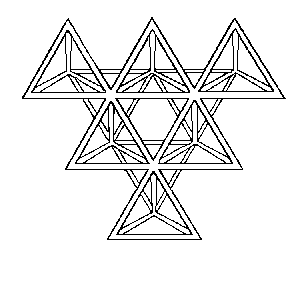
Return to Mark/Space
Born 1478 in Milk Street, London, England.
"Sir Thomas More was one of the most scintillating and contradictory examples of the Renaissance man: lawyer, statesman, humanist, ascetic, author of Utopia , advocate for equal rights for women, enlightened teacher, Henry VIII's Lord Chancellor and, finally, the role which was highlighted in the Robert Bolt play A Man For All Seasons : Roman Catholic martyr." --Francis Gilbert (in The Guardian , 26 February 1998).
1491 -- Entered the service of Cardinal Morton, Archbishop of Canterbury.
1498 -- Met Erasmus, dutch scholar and humanist, who became his life-long friend.
1503 -- Became a member of Parliament.
1505 -- Married Jane Colt.
Between 1505 and 1510, Jane bore 4 children: 3 daughters (Margaret, Cecilia, Louisa) and 1 son (John). They lived in Chelsea.
1510 -- Jane Colt died.
With 4 children to care for (the oldest being only 5 years old), More then married Alice Middleton, seven years his senior. He often commented (with a smile): "This lady is neither young nor pretty, but she is a good manager."
1514 -- Thomas More was sent to the Low Countries (Flanders) to discuss a commercial treaty. While there, he met and became friends with Peter Gilles, the town clerk of Antwerp.
"I could perhaps write that I met an old sailor in your house here in Antwerp. I would introduce that man as a globe-trotter who had travelled all over the world and had seen places we don't even know the existence of. And what he had seen there was so unbelievable when compared to life in Europe that the islands and countries he had visited would seem to belong to another world. So the title of my book would be 'Utopia', a word that means 'Nowhere'. That sailor would also have travelled all over Europe, and lived for some time in France and Germany and England. That was why he could compare the ideal community he got acquainted with in Utopia to the ones he got to know in our countries. In that way I would keep out of the matter." --Thomas More.
1529 -- Thomas More succeeded Cardinal Wolsey (who was removed from office by Henry VIII) as Lord Chancellor (Prime Minister).
When King Henry VIII separated from Catherine of Aragon (the daughter of Ferdinand and Isabella of Spain), More resigned his position as Chancellor.
Henry VIII ordered More to recognize his marriage (1533) to Anne Boleyn as lawful, and his new self-proclaimed (1534) title as supreme Head of the Church. When Thomas refused, the King had him imprisoned in the Tower of London (built by William the Conqueror in 1078).
1535 -- Thomas More died by beheading on the orders of Henry VIII.
Father: Judge Sir John More.
Studied Latin and Greek at Oxford, and law in London.
In conversation, More said to Gilles:
"...it is my intention to write a book about the way a country should be governed according to my principles. But it is dangerous to write about those things in England. Our King Henry is so easily hurt....
After his return to London, he wrote the first chapters of Utopia , the book which launched a new genre of fiction.
Thomas More page
(link supplied by Jaime)
|
|
|

Return to Mark/Space